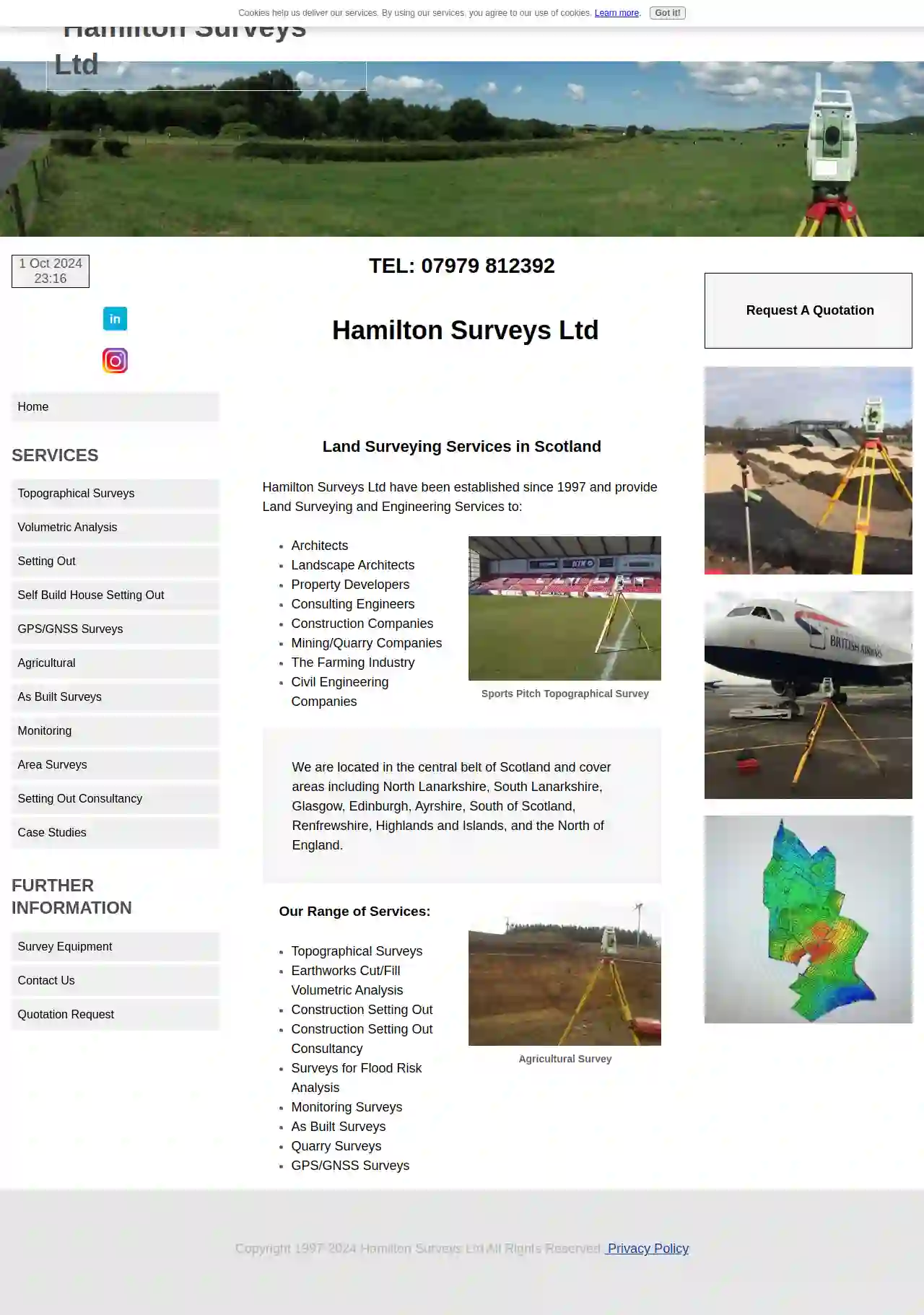Excavation Contractors Uddingston
Top 10 Excavating Contractor in Uddingston
Receive multiple Trenching Services quotes for your project today! Compare profiles, reviews, accreditations, portfolio, etc... and choose the best service.

Hamilton Surveys Ltd
4.52 reviewsHamilton, GBHamilton Surveys Ltd Hamilton Surveys Ltd has been established since 1997 and provides Land Surveying and Engineering Services to a wide range of clients, including: Sports Pitch Topographical Survey Architects Landscape Architects Property Developers Consulting Engineers Construction Companies Mining/Quarry Companies The Farming Industry Civil Engineering Companies We are located in the central belt of Scotland and cover areas including North Lanarkshire, South Lanarkshire, Glasgow, Edinburgh, Ayrshire, South of Scotland, Renfrewshire, Highlands and Islands, and the North of England.
- Services
- Why Us?
- Gallery
Get Quote
Centra Tech Drainage LTD
59 reviewsHamilton, GBWelcome to Centra Tech Drainage Ltd Your Trusted Partner in Drainage Solutions We specialize in providing top quality drainage services to residential and commercial customers alike. Whether it’s dealing with clogged drains, slow drainage, or other issues, we’re here to help. Our team of experts is dedicated to providing fast, efficient, and reliable solutions to get your drainage system running smoothly again.
- Services
- Why Us?
- Gallery
Get Quote
MDS Landscape and Design Ltd
83 Gartloch Way, Gartcosh, G69 8FD, GBExperienced garden landscapers in Glasgow When it comes to garden landscaping and design, MDS Landscape and Design Ltd is the company to contact. If you are thinking of having your garden landscaped, get in touch by completing our contact form or giving us a call. Here at MDS Landscape and Design Ltd, we have more than 30 years of combined experience in garden landscaping, working with homeowners and commercial clients alike. Based in Glasgow, we work across a wide area, which includes Lanarkshire, West Lothian, Midlothian, and Renfrewshire. Our company is built on the foundation of customer satisfaction, and we approach each project with the same level of care and attention to detail that we would like for our own garden. Whatever type of hard or soft landscaping project you are considering, get in touch with us for a competitive quotation.
- Services
- Why Us?
- Testimonials
- Gallery
Get Quote
Burgh Resin Specialists
Hamilton, GBScotland's Epoxy Resin Surfacing Experts Burgh Resin Specialists are resin surface professionals providing resin bound driveways, rubber crumb flooring and Savoro flooring across Edinburgh, Glasgow, Falkirk, Fife and The Lothians. Working only with premium quality resins produced from traceable UK materials, we are experts in installing resin surfacing that outperforms any others on the market. We are Burgh Resin, specialist resin surfacing suppliers and installers working across Edinburgh, Glasgow, Falkirk, Fife and The Lothians, providing the strongest driveways, external and internal resin surfacing in the UK.
- Services
- Why Us?
- Gallery
Get Quote- Ti
Tinto Sand & Gravel Ltd
Hamilton, GB- Services
- Why Us?
Get Quote - Wi
William Shanks Construction
Hamilton, GB- Services
- Why Us?
Get Quote - Dy
Dyno
Hamilton, GB- Services
- Why Us?
Get Quote - No
Northlanarkshire Garden Care
52 reviewsHamilton, GB- Services
- Why Us?
Get Quote - J
J & J Ferguson Ltd
Hamilton, GB- Services
- Why Us?
Get Quote - (R
(Road Surfacing) (tarmac Driveways) Lanarkshire Glasgow. Wjt Trades Ltd
4.73 reviewsHamilton, GB- Services
- Why Us?
Get Quote
Over 13,059+ Excavation Pros onboarded
Our excavation companies operate in Uddingston & surroundings!
ExcavationHQ has curated and vetted Top Excavation Contractors arround Uddingston. Find a top & trustworthy contractor today.
Frequently Asked Questions About Excavation Contractors
- Topsoil Removal: Stripping the fertile topsoil layer from a site, often preserving it for landscaping.
- Trench Excavation: Digging long, narrow trenches for utilities (pipes, cables) or foundations.
- Basement Excavation: Removing earth to create a space for a basement beneath a structure.
- Pool Excavation: Digging a precise hole for installing a swimming pool.
- Roadway Excavation: Removing earth and preparing the ground for road construction.
- Demolition Excavation: Clearing debris and preparing the site after demolition.
- Channel Excavation: Creating channels for drainage or irrigation.
- Hauling to Designated Disposal Sites: Transporting excavated material to approved landfills or recycling centers.
- Recycling or Reuse: If suitable, some excavated soil might be recycled for other projects or reused on-site for landscaping or backfilling.
- Complying with Regulations: Adhering to local and environmental regulations for soil disposal to prevent contamination or illegal dumping.
- Excavators: Versatile machines with a bucket, arm, and rotating cab for digging, lifting, and moving earth.
- Backhoes: Similar to excavators but with a digging bucket on the back and a loader bucket on the front, ideal for trenching and smaller excavations.
- Bulldozers: Powerful machines with a large blade for pushing earth, clearing land, and leveling surfaces.
- Skid Steers: Compact and maneuverable loaders with various attachments (buckets, forks) for digging, loading, and grading in tight spaces.
- Trenchers: Specialized machines for digging narrow trenches for utilities.
- Dump Trucks: Vehicles for hauling excavated material to disposal sites.
- Mechanical Excavation: Utilizing heavy equipment like excavators, backhoes, bulldozers, and loaders, suitable for most projects.
- Hand Excavation: Using hand tools (shovels, picks) for smaller excavations or delicate work near utilities.
- Blasting: Employing explosives to break up rock or hard materials, typically for large-scale projects.
- Hydro Excavation: Using high-pressure water jets to loosen and remove soil, often used for locating utilities or delicate excavation.
- Vacuum Excavation: Employing a vacuum system to suck up excavated material, suitable for safe excavation near utilities or in confined spaces.
What are the different types of excavation?
How do you handle soil disposal after excavation?
What equipment is used for excavation?
What are the different methods of excavation?
What are the different types of excavation?
- Topsoil Removal: Stripping the fertile topsoil layer from a site, often preserving it for landscaping.
- Trench Excavation: Digging long, narrow trenches for utilities (pipes, cables) or foundations.
- Basement Excavation: Removing earth to create a space for a basement beneath a structure.
- Pool Excavation: Digging a precise hole for installing a swimming pool.
- Roadway Excavation: Removing earth and preparing the ground for road construction.
- Demolition Excavation: Clearing debris and preparing the site after demolition.
- Channel Excavation: Creating channels for drainage or irrigation.
How do you handle soil disposal after excavation?
- Hauling to Designated Disposal Sites: Transporting excavated material to approved landfills or recycling centers.
- Recycling or Reuse: If suitable, some excavated soil might be recycled for other projects or reused on-site for landscaping or backfilling.
- Complying with Regulations: Adhering to local and environmental regulations for soil disposal to prevent contamination or illegal dumping.
What equipment is used for excavation?
- Excavators: Versatile machines with a bucket, arm, and rotating cab for digging, lifting, and moving earth.
- Backhoes: Similar to excavators but with a digging bucket on the back and a loader bucket on the front, ideal for trenching and smaller excavations.
- Bulldozers: Powerful machines with a large blade for pushing earth, clearing land, and leveling surfaces.
- Skid Steers: Compact and maneuverable loaders with various attachments (buckets, forks) for digging, loading, and grading in tight spaces.
- Trenchers: Specialized machines for digging narrow trenches for utilities.
- Dump Trucks: Vehicles for hauling excavated material to disposal sites.
What are the different methods of excavation?
- Mechanical Excavation: Utilizing heavy equipment like excavators, backhoes, bulldozers, and loaders, suitable for most projects.
- Hand Excavation: Using hand tools (shovels, picks) for smaller excavations or delicate work near utilities.
- Blasting: Employing explosives to break up rock or hard materials, typically for large-scale projects.
- Hydro Excavation: Using high-pressure water jets to loosen and remove soil, often used for locating utilities or delicate excavation.
- Vacuum Excavation: Employing a vacuum system to suck up excavated material, suitable for safe excavation near utilities or in confined spaces.